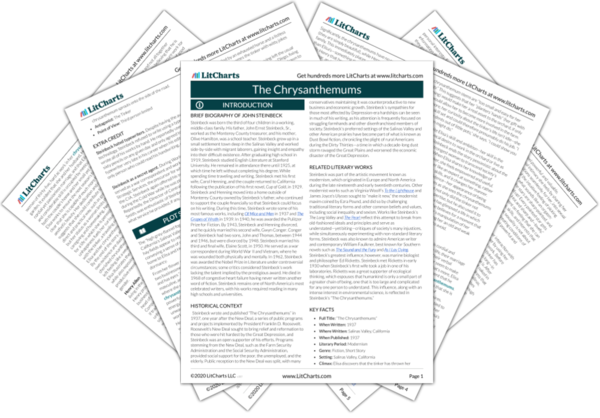Throughout “The Chrysanthemums” scissors connote a sense of masculine power and control. Elisa is rarely without her scissors throughout most of the story. She has a special pocket in her apron devoted to her scissors and she uses them in her chrysanthemum garden to cut down the previous season’s growth. In her garden, Elisa’s “short and powerful scissors” serve as a phallic symbol, causing her feminine work to appear “over-eager” and “over-powerful.” That she uses scissors to trim the plants at once suggests a certain stifling of her potential, and an assertive care that allows for new growth. When the tinker arrives on Elisa’s property, much of their conversation revolves around scissors. Steinbeck draws additional attention to the tool by misspelling “sisors” on the side of the tinker’s wagon, and the tinker boasts about his ability to sharpen even the dullest of blades: “Most people just ruin scissors trying to sharpen ‘em, but I know how.” Given the previous connotation of the tools with masculinity, this suggests a certain manly prowess, even as the misspelling subtly mocks the tinker’s expertise in contrast to Elisa’s. No matter how adept Elisa may be with the tools, however, their power is unavailable to her specifically because of her gender; even as she insists she can “sharpen scissors too,” the tinker tells her his lifestyle “would be a lonely life for a woman.”
Scissors Quotes in The Chrysanthemums
She was thirty-five. Her face was lean and strong and her eyes were clear as water. Her figure looked blocked and heavy in her gardening costume, a man’s black hat pulled low down over her eyes, clodhopper shoes, a figured print dress almost completely covered by a big corduroy apron with four big pockets to hold the snips, the trowel and scratcher, the seeds and the knife she worked with.










